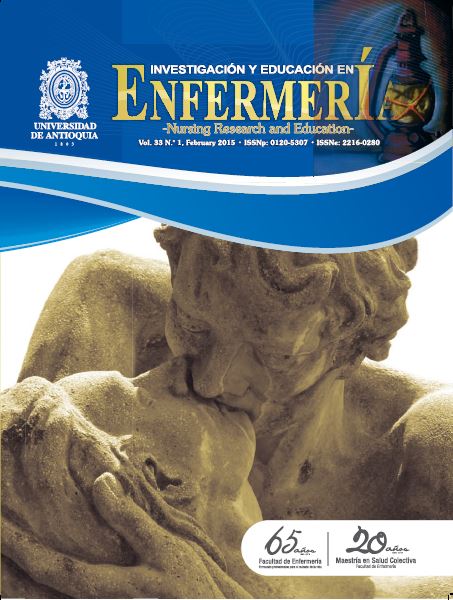Ethical considerations in research. Focus on vulnerable groups
DOI:
https://doi.org/10.17533/udea.iee.21901Keywords:
Ethics, research, nursing research, risk groups.Abstract
The purpose of this paper was to describe the need to protect the rights of human subjects participating in nursing research, and procedures for doing so. The path taken to the task at hand was to approach the topic by discussing the philosophical underpinnings of human subject protection and describing the approach for doing this in all cases where humans are used as research subjects. These underpinnings include specific ethical principles of respect for persons, beneficence, and justice, and the procedures used in the U.S. for protecting the rights of human subjects. Once the process was clarified, the considerations necessary to protect the special groups referred to as “vulnerable” are discussed. Given the author’s access to U.S. documents and the fact that U.S. government agencies took early steps to formalize rules and regulations for the protection of human subjects, vulnerable or otherwise, the experience of the United States was selected for presentation. It is recognized that there are now relevant international documents that are exceedingly helpful, and also, that various countries may have their own guidelines for investigators to follow. In such cases researchers can engage in comparative analysis between their own guidance and the processes described here, and decide their path accordingly.
How to cite this article: Ketefian S. Ethical considerations in research. Focus on vulnerable groups. Invest Educ Enferm. 2015; 33(1):
Downloads
References
(1) Nuremberg Code [Internet]. 1947 [cited June 15, 2014]. Available from: http://www.bmj.com/content/313/7070/1448.1
(2) World Medical Association). Declaration of Helsinki – Ethical Principles for Medical Research Involving Human Subjects [Internet]. 2008 [cited August 20, 2014]. www.wma.net/en/30publications/10policies/b3/
(3) National Commission for the Protection of Human Subjects of Biomedical and Behavioral Research. The Belmont Report: Ethical principles and guidelines for research involving human subjects [Internet]. 1979 [cited June 15, 2014]. Available from: http://www.hhs.gov/ohrp/index.html
(4) American Nurses Association. Code of Ethics with Interpretive Statements [Internet]. Washington, DC: American Nurses Association; 2001 [cited June 16, 2014]. Available from: http://www.nursingworld.org/codeofethics
(5) Beauchamp TL, Childress JF. Principles of biomedical ethics. 4th Ed. New York: Oxford University Press; 1994.
(6) Collaborative Institutional Training Initiative (CITI) [Internet]. 2013 [cited June 25, 2014]. Available from: https://www.citiprogram.org
(7) University of Michigan (2013b). Program for Education and Evaluation in Responsible Research and Scholarship (PEERRS) [Internet]. 2013 [cited July 26, 2014]. Available from: http://my.research.umich.edu/peerrs/
(8) Office for Human Research Protections. Code of Federal Regulations. 45 CFR 46.116. Code of Federal Regulations, DHHS, Title 45, part 46, [Internet]. 2009 [cited June 26, 2014]. Available from: http://www.hhs.gov/ohrp/humansubjects/regbook2013.pdf.pdf
(9) U.S. Department of Health & Human Services (DHHS). Institutional Review Board Guidebook, Chapter VI [Internet]; 1993 [cited August 20, 2014]. Available from: http://www.hhs.gov/ohrp/archive/irb/irb_chapter6.htm
(10) World Health Organization. Standards and operational guidance for ethics review of health-related research with human participants [Internet]. 2012 [cited August 22, 2014]. Available from: http://whqlibdoc.who.int/publications/2011/9789241502948_eng.pdf Accessed
(11) University of Michigan. Informed Consent. Health Sciences & Behavioral Sciences IRB [Internet]; 2013 [cited July 26, 2014]. Available from: http://www.irb.umich.edu/policies/consent/
(12) University of Michigan. Relevant guidance for informed consent. IRB-Med [Internet]; 2013 [cited August 16, 2014]. Available from: http://www.irb.umich.edu/policies/
(13) U.S. Department of Health & Human Services. Office for Human Research Protections (OHR) [Internet]; 2013 [cited August 20, 2014]. Available from: http://www.hhs.gov/ohrp/index.html
(14) U.S. Department of Health & Human Services. Office of Behavioral and Social Sciences Research. 2013 [cited June 15, 2014]. Available from: http://obssr.od.nih.gov/index.aspx
(15) Midwest Nursing Research Society. Guidelines for Scientific Integrity. 2nd Ed. Wheat Ridge, CO: Midwest Nursing Research Society; 2002.
Downloads
Published
How to Cite
Issue
Section
License
Derechos de propiedad / Direitos de Propriedade
English: If the article is accepted for publication, all copyright will be of exclusive property of Investigación y Educación en Enfermería. The text and the graphics included in the publication are exclusive responsibility of the authors and not necessarily reflect the thought of the Editorial Committee.
Español: Si el artículo es aprobado para publicación, todos los derechos son de propiedad de Investigación y Educación en Enfermería. El texto y las gráficas incluidas en la publicación son de exclusiva responsabilidad de los autores y no necesariamente refleja el pensamiento del Comité Editorial.
Português: Se o artigo for aceito para publicação, todos os direitos autorais serão de propriedade exclusiva de Investigación y Educación en Enfermería. O texto e os gráficos incluídos na publicação são de responsabilidade exclusiva dos autores e não refletem necessariamente o pensamento do Comitê Editorial.















